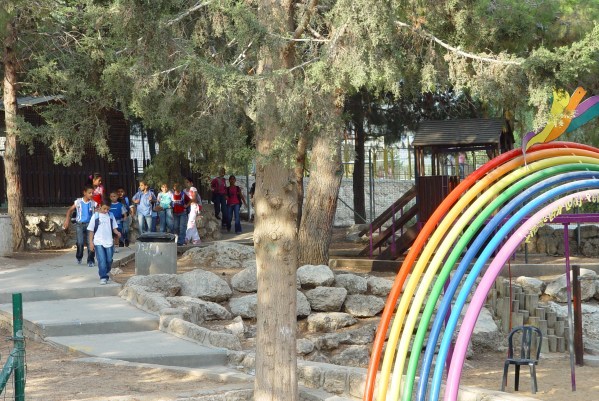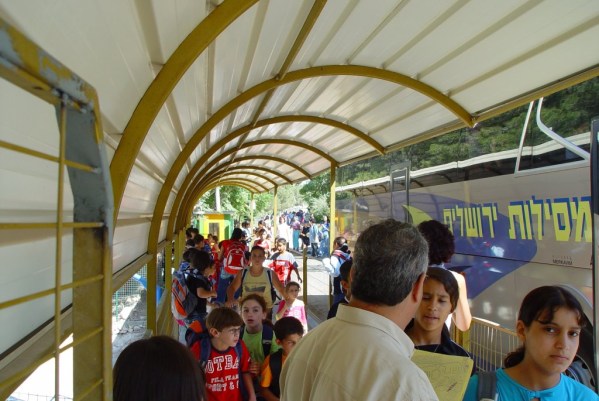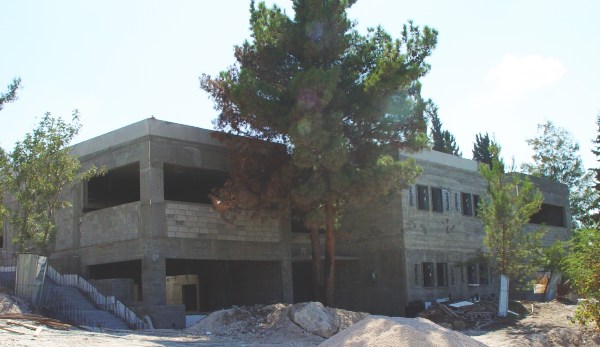Home > Oasis of Peace > Projects & Outreach > Children’s Educational System > The Primary School in 2004-2005
The Primary School in 2004-2005
Friday 12 November 2004

The NSWAS Primary School continues in its efforts to provide a mature comprehensive binational education framework for children of the Village and some 30 communities in the surrounding area.
The School opened this year with 228 children, many of them entering at the first grade level and having a realistic prospect of remaining in the NSWAS school framework all the way through junior high school.
A well-trained group of teachers awaited them, and a new co-principal, Ms. Dalia Lugasi, who will join Faiz Mansour, her Palestinian counterpart. The summer months had been occupied by preparations for the new school year and the search for a new co-principal after Maya Karni’s departure. Under the rules governing official schools, the NSWAS school association is entitled to recommend candidates, but it is the state educational board that appoints them. This year, the board overruled our recommendation of NSWAS resident Eti Edlund, since under its operational rules for schools like ours it preferred candidates from outside the home community. We challenged this in the High Court and managed to obtain a compromise whereby Eti would continue to be involved in essential aspects of the administration, and whereby the Ministry would be required to include representatives of the NSWAS school association on the board for future appointments. We wish to thank all of our friends who supported us in these efforts.
Transportation
As always in running something as large as a school, many of the principle challenges are the prosaic ones, like making sure the children can arrive safely on a morning. Our main problem with transportation is budgetary. From January 2004, the Education Ministry stopped its transportation support for schools such as ours. The step was just one of the severe cutbacks in education and welfare budgets throughout the country. As a direct result of the transportation cut-back, by the end of the school year we had incurred a debt of hundreds of thousands of Sheqels.
We were particularly affected by the Ministry’s decision since our school has a wide catchment area, where most of the students are from outside our own regional council. We knew that it would be close to impossible to maintain the transportation system that brings our students daily.
The friends associations that support NSWAS in Europe and America were not slow in coming to our support. They managed to scrape together funding for two new school buses, with the promise of a third on the way. By placing these buses at the disposal of our regional council, we are able to obtain its longterm cooperation in transportation, thereby alleviating a cost that would otherwise be impossible for the school and parents to support. We deeply thank everyone who participated in this great effort.
Another related improvement this year was the widening and renovation of the narrow access road to the village, which had already been a factor in accidents involving school buses. Here too, we have to thank our friends rather than the state, which in other countries might be expected to cover such an expense. A donation from the British Friends Association made the project possible, and the daily journeys of the school children are now much safer.
New School Building
Thanks again to our friends’ associations, rather than the state, a new school building is being built in the village. The first stage of construction, which includes the shell and preparations for electrical and plumbing systems, was completed this summer. The finishing stage will commence shortly. The spacious new building will alleviate the overcrowded conditions prevailing in the existing school building and the various prefabricated structures that have sprung up around it. Thanks especially to the American Friends for their continued support of the project.
We also thank all of the friends and foundations that provide their long term support to maintaining the school since, despite its official status, only a quarter of its operational budget is actually provided by the state.
The NSWAS school remains an island of sanity and hope in the troubled social and educational environment of the Middle East. The continued trust of parents and the enthusiasm of its pupils proves to be a greater asset than the indifference, negligence and sometimes active hindrance of the authorities. It is surprising that the latter do not take more interest in such an educational model when every aspect of official policy has failed to stem the growing antagonism between Israel’s Arab and Jewish citizens.
The energy of the teaching staff, the adaptations they make to create a normal schooling environment in an abnormal reality, and the innovations they routinely introduce, make for a happy student population that derives from the school a good education, an unprejudiced outlook, and a basis to hope for a better future in the Middle East.





